Give your back a break - these are the 9 best thick yoga mats for ultimate support
These thick yoga mats have at least 6mm of cushioning, making them the go-to support for your joints through yoga, Pilates, and strength workouts

Ciara McGinley
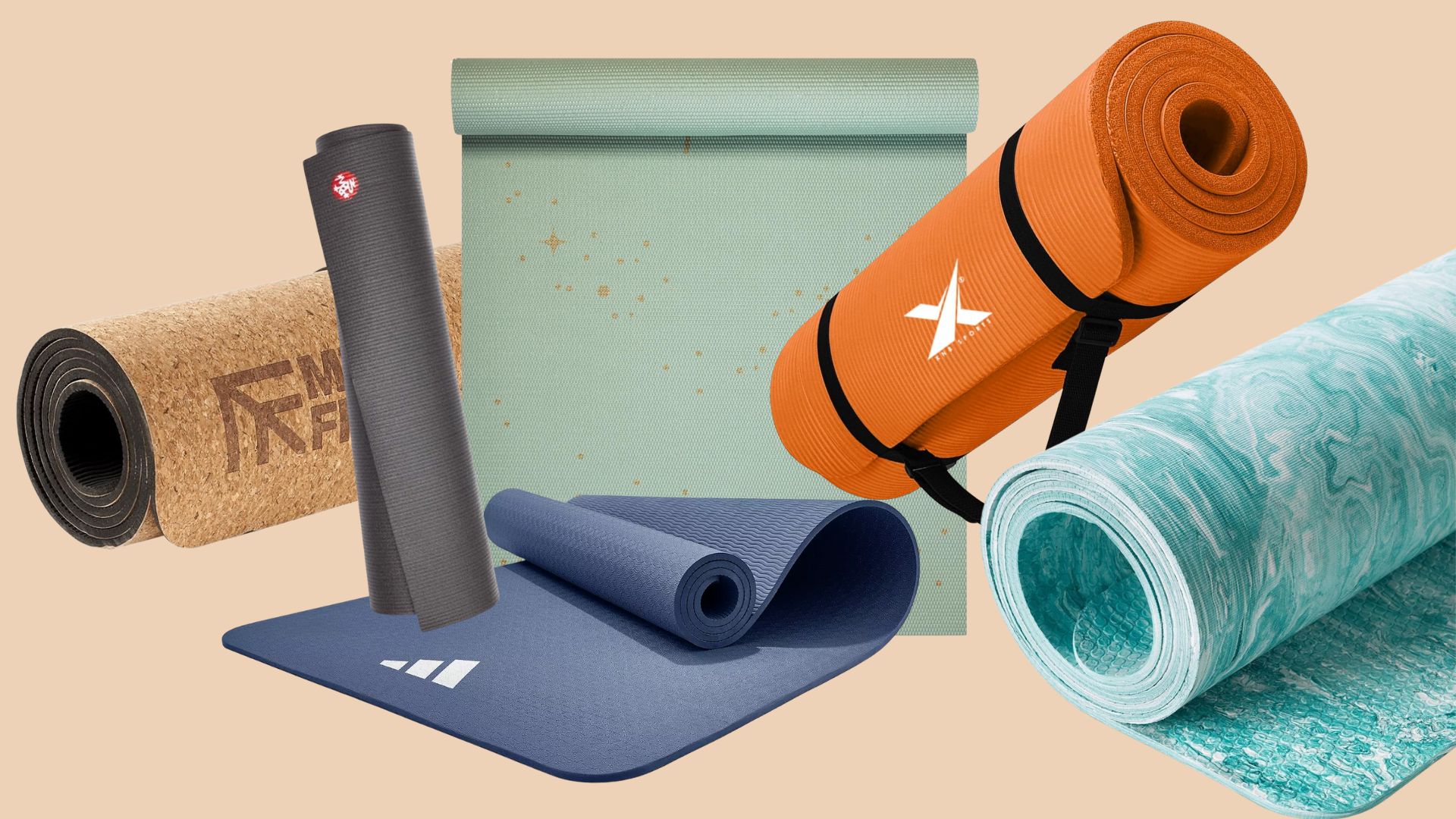
Sign up to our free daily email for the latest royal and entertainment news, interesting opinion, expert advice on styling and beauty trends, and no-nonsense guides to the health and wellness questions you want answered.
You are now subscribed
Your newsletter sign-up was successful
Want to add more newsletters?

Daily (Mon-Sun)
woman&home Daily
Get all the latest beauty, fashion, home, health and wellbeing advice and trends, plus all the latest celebrity news and more.

Monthly
woman&home Royal Report
Get all the latest news from the Palace, including in-depth analysis, the best in royal fashion, and upcoming events from our royal experts.

Monthly
woman&home Book Club
Foster your love of reading with our all-new online book club, filled with editor picks, author insights and much more.

Monthly
woman&home Cosmic Report
Astrologer Kirsty Gallagher explores key astrological transits and themes, meditations, practices and crystals to help navigate the weeks ahead.
It's a thick yoga mat or nothing, for me. As the woman&home health channel editor, I've spent the past few years trialling and testing them all, and they are hands-down the better option for support, cushioning, and durability.
Sitting among the best yoga mats, the extra cushioning can be a saviour for classic yoga flows, Pilates workouts, and weighted workouts if you suffer from stiff joints, have previous injuries, or want to be more comfortable.
However, it's important to find the right one for you. A mat that's too thin is no good, but a mat that's too thick may be unstable, heavy to carry, hard to store, and difficult to roll out. To find the happy medium, the health team has scoured brands like Gaiam, Yogamatters, and Adidas, testing each mat against criteria including thickness, grip, design, and weight to find the best thick yoga mats available to buy online. We also spoke to experts to discover the must-have features.
The best thick yoga mats as tested by us
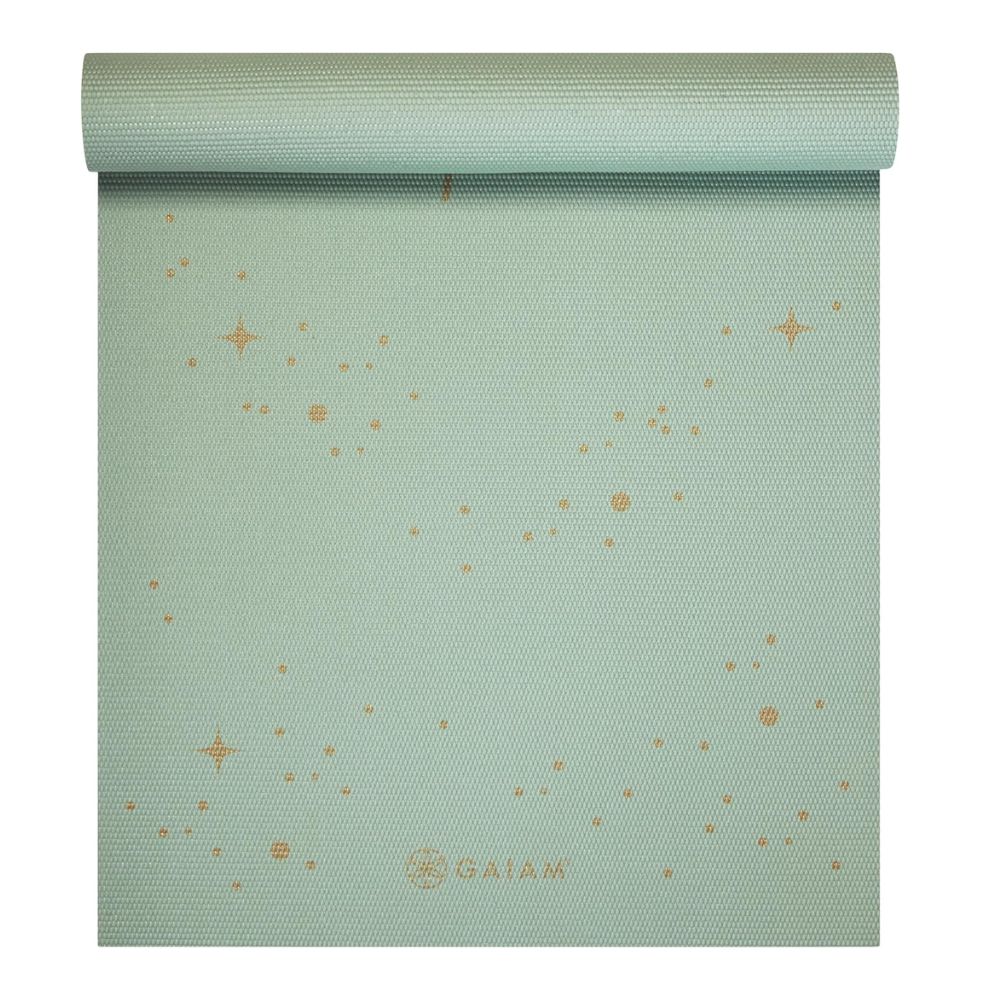
Thickness: 6mm | Weight: 1.59kg
Designed with all exercises in mind, but especially yoga workouts, Gaiam's Premium 6mm Thick Yoga Mat isn't just premium in name. It delivers cushion underfoot, support, and a wipe-clean design that's durable over time. I also love the selection of colours and patterns available - especially this mint green.
Since I bought this mat at the beginning of the year, I've used it for a range of yoga, Pilates, strength workouts, and stretching. I find there's just enough cushion to take away the pressure from my joints, without leaving me feeling unbalanced while standing. I love it because it's so grippy on the bottom, so it stays put through the whole workout, and the synthetic polymer doesn't get slippery when you get sweaty.
In the summer, I even took it outside to make the most of the sunshine, and there wasn't a mark on it after a quick wipe. It's also very easy to store away in a cupboard or leave in the corner of the room as it rolls up tightly and stays put, without needing a strap.
The only downside I'd flag is the plastic smell when it comes out of the box. It's intense and takes a few weeks to fade properly, but I can't smell it at all now. Overall, it's a very small price to pay for this budget-friendly buy. Coming in at under £40, it's significantly more budget-friendly than others I've tried recently.
Pros
- Very durable
- Great for all types of workout
- A variety of price points
- Lots of colours to choose from
Cons
- PVC material may not suit everyone
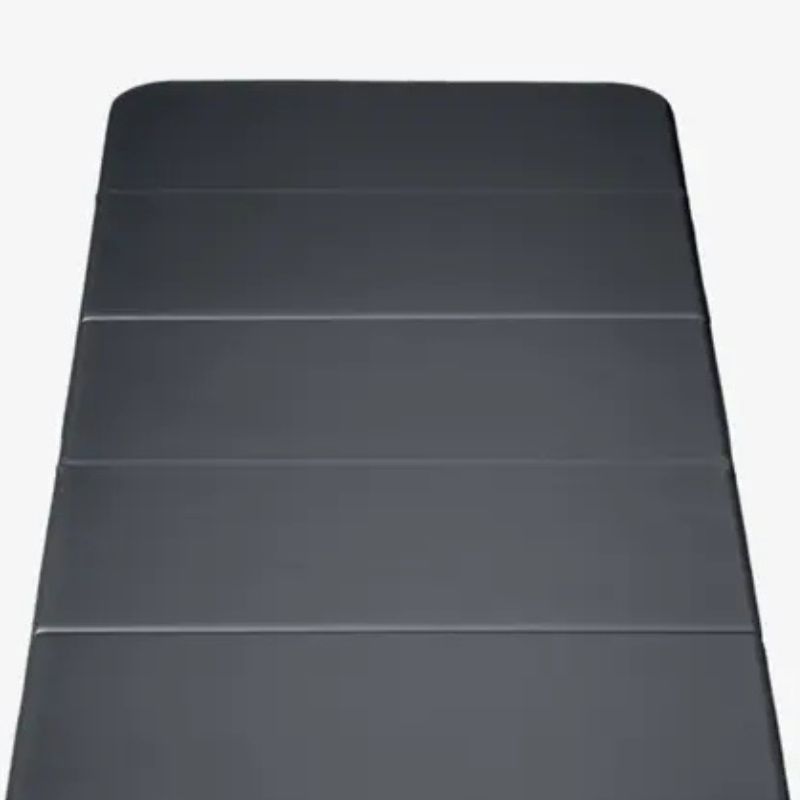
Thickness: 12mm | Weight: 1.3kg
The Stakt mat is my favourite for stretching and my Pilates abs workout, where I'm spending most of the time on my back. It feels firm yet supportive under my back, making it suitable for those looking for serious support, but without that spongy feel in some of the cheaper super-thick mats.
While many of the best thick yoga mats roll up, this one folds away to create a pad that you can also use as a yoga block. It's dual purpose, and if you regularly use a yoga block in your practice, it might even save you money in the long run. I tend to fold it up into a block to stretch out my hip flexors and glutes. The added height really makes a difference.
It's a great option for anyone hunting for the most support possible, but the premium, soft-yet-grippy materials are unmatched in this guide, making it also a good option for anyone looking to be as comfortable as possible as well.
Although it's one of the more expensive mats on my list, I believe that the combination of support, comfort, and versatility makes it well worth the extra spend compared to the Gaiam Premium Thick Yoga Mat, for example, if you have the budget.
Pros
- Lightweight
- Very versatile design
- Grippy underfoot
- Premium feel
- Easy to store
Cons
- Most expensive on this list
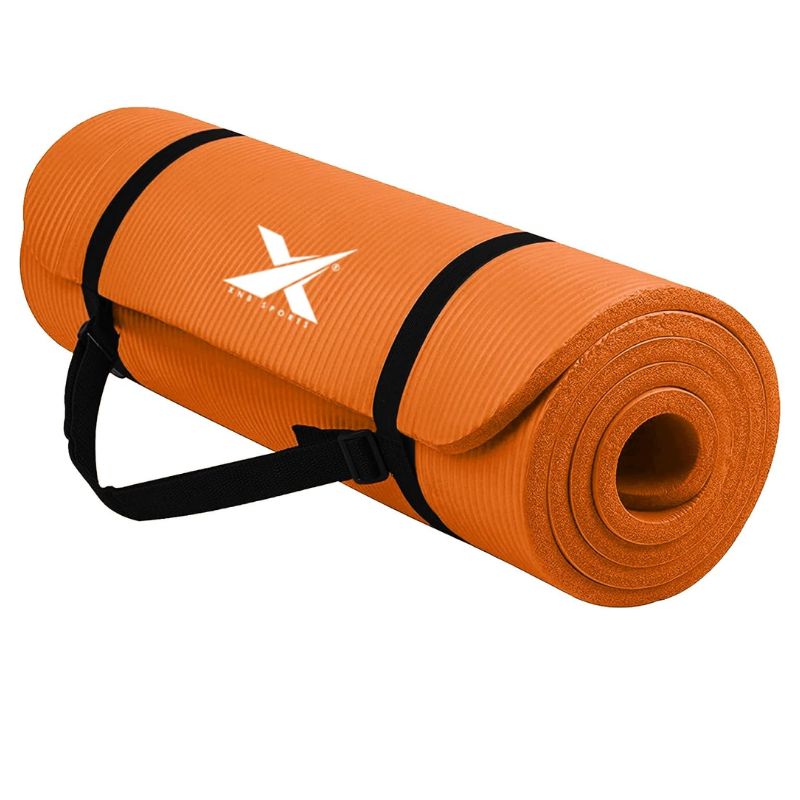
Thickness: 10mm or 15mm | Weight: 1.1kg
For just over £10 and with a choice of two supreme thicknesses, it doesn't get much better than the Xn8 Sports Thick Yoga Mat. If you're looking for one of the best yoga mats to buy on Amazon that's also lightweight and ultra-thick, this is the one.
There are two thickness options (10mm or 15mm), and I opted for the thinner option, which I found was enough to support my joints. It feels at least three times thicker than the Gaiam Premium Yoga Mat but spongier than the Stakt Premium Mat. I have no complaints, though. While I wouldn't use it for anything too vigorous, for knee exercises and back exercises, it's a winner.
I admit I went into the testing process for this mat with minimal expectations, given the price tag, but I was very pleasantly surprised. The mat felt durable and reliable during workouts where I was moving around a lot or holding a pose for a longer period. It stuck on the floor without curling up, too, which is a plus.
Another plus - it's sold on Amazon, meaning you'll get quick and reliable delivery with this one. However, given the thickness, it's not a mat I'd recommend for the studio. Despite being relatively lightweight thanks to the rubber material, it's still bulky to carry around. For studio sessions, I'd recommend the Strongtek Extra Thick Yoga Mat.
Pros
- Suitable for all kinds of workouts
- Very supportive
- Quick delivery
- Good colour range
Cons
- Bulky to carry around
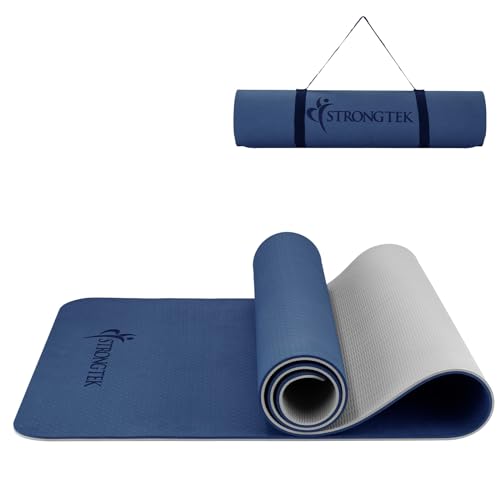
Thickness: 8mm | Weight: 1kg
At 8mm thickness, the Strongtek Extra Thick Yoga Mat is ideal for keeping in the studio or in your home for a quick session of Pilates for beginners. It has a double-layer structure and is made from TPE, which makes it feel durable and secure feel underfoot.
I have three yoga mats in rotation, and this is one of them. I use this one for everything from Pilates to my weekly weights workout, as it's just the right blend of supportive and stable, being under 10mm. The material feels grippy underfoot but not sticky, and it feels soft without socks. When I took it out of the packaging, I was happy to see the underside had a grippy bottom too, which meant I could use it on wooden or tile floors without an issue.
It's also very lightweight and cleans well, making it suitable for sweatier workouts or sharing with others. However, I did notice that the mat had a distinctive smell on the first opening, and you have to lay it out for a couple of hours to make it flat enough to use. But, otherwise, for less than £40, it's an excellent buy.
Pros
- Very versatile
- Suitable for wood or tile floor
- Budget-friendly
Cons
- May be too much for those who just want to stretch
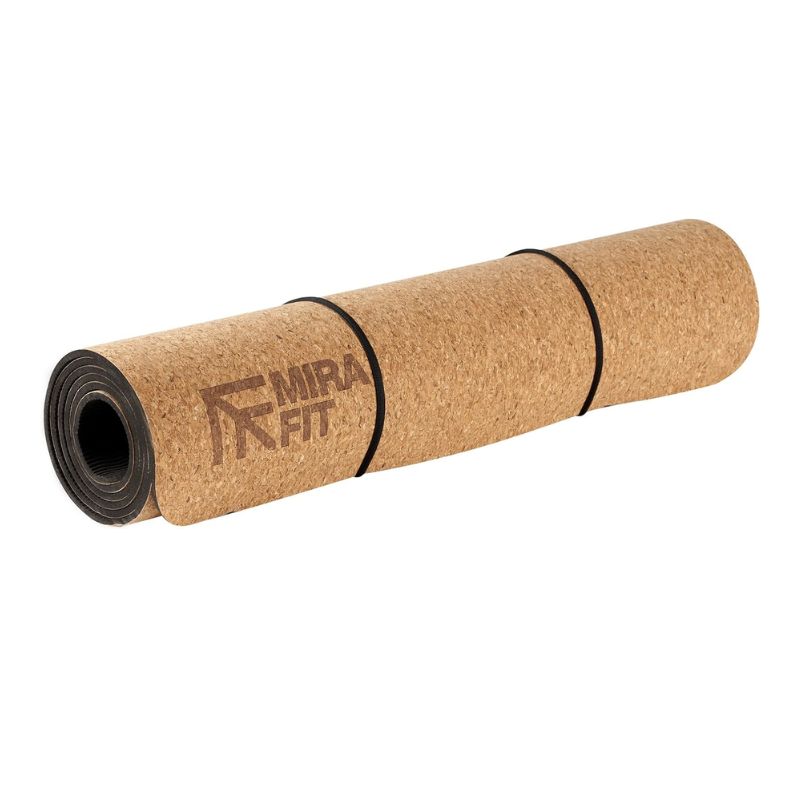
Thickness: 6mm | Weight: Less than 1kg
If you're more invested in a good grip and durability (along with comfort, of course) in your mat than anything else, a cork yoga mat might be a better option for you. The top layer feels smooth to the touch, but it's still grippy when in use, and the material deals with sweat quickly, hiding any marks and making it easy to clean your yoga mat. This also means the mat is a versatile option, as suitable for yoga as for heavier, sweatier workouts.
I've had this mat for about seven months now, and I use it for stretching and weighted workouts every few days. When I first opened the box, I was surprised by how thin the cork felt, and I was a little disappointed. But when I got going, I realised that it offered more than enough cushioning for core exercises and my regular weight training workouts. It's also held up really well over time and looks almost as good as the day I got it.
While the Mirafit Cork Yoga Mat does have a TPE foam backing and arrives in a plastic wrap, it's a more sustainable option than the PVC-only options on our list, as cork is a natural material.
Pros
- Very versatile
- Excellent for sweaty workouts
- Natural material
- Good support
Cons
- Not entirely made of cork
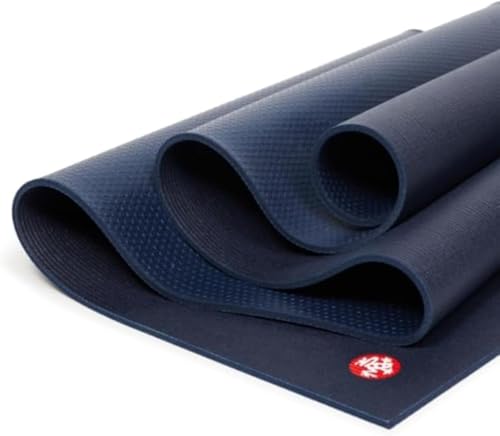
Thickness: 6mm | Weight: 3.4kg
Looking for a durable yoga mat that will last a whole lifetime? If you can take the weight, the Manduka Pro Premium 6mm Thick Yoga Mat might be for you. It blends exceptionally high-quality materials with functional use, offering a great balance between cushioning and stability for all kinds of sessions. I tested this yoga mat in a month's worth of yoga classes, Pilates workouts, and home sessions.
While it feels springy and supportive underfoot, the big selling point of this mat is the grip on the underside. I felt secure even on tile flooring, but still felt able to move freely with the thick cushioning under me for support.
If you prefer a darker colour to complement your black gym leggings, this is a great choice as it's only available in muted greens, reds, and blues. It also comes in different sizes to suit yoga lovers of all heights (from 71" to 85").
The only downside - and this goes for most other premium mats too - is that the Manduka Pro Premium 6mm Thick Yoga Mat comes with a little extra weight. At just over 3kg for the regular length, it's one of the heavier mats on the list - almost 2kg more than the Xn8 Sports yoga mat, which is double the thickness. However, this makes it a better choice, in my opinion, for those who prefer to practice at home rather than take their mat to the studio. The premium quality is also unmatched.
Pros
- Latex-free luxury
- Durable
- Long lasting
- Feels very premium
Cons
- Heavy to carry
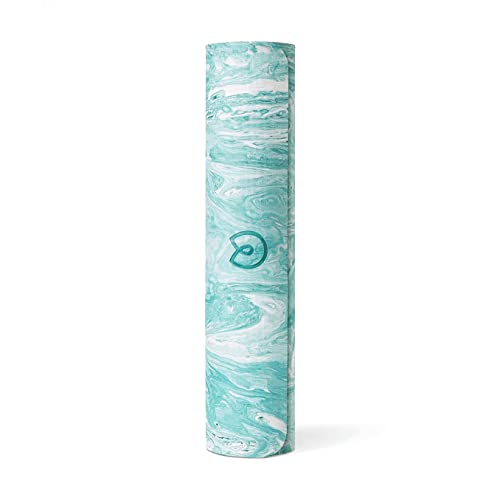
Thickness: 5mm | Weight: 800g
If you're a taller yogi, you'll naturally benefit from a longer mat. I'm 6ft tall, and I tested this mat for a couple of weeks to see if it held up across yoga, HIIT, and full-body Pilates workouts.
I've never prioritised longer mats (with options like the Stakt mat, I've never felt I had to), but I have to admit there is a benefit to having a longer length mat. I never found my toes stretching over the edge during a lunge, and I didn't have to keep shuffling down to keep my head on the mat when lying down. It's also very lightweight at 0.75kg, which makes it very easy to carry around.
While I have broken my own rules by allowing a 5mm mat into this list, I didn't find the thickness to be too limiting. It was just right for my weighted workouts and more active yoga sessions, but I would suggest another option for anything where you're on the ground for longer. I also appreciated the bright water-inspired colour, though it looks brighter online than it does in person. It's also not as wide as other yoga mats I've used, but I didn't find it to be a limiting problem.
Pros
- Particularly suitable for taller people
- Relatively lightweight
- Pleasing colour
- Easy to store
Cons
- Below minimum thickness requirement
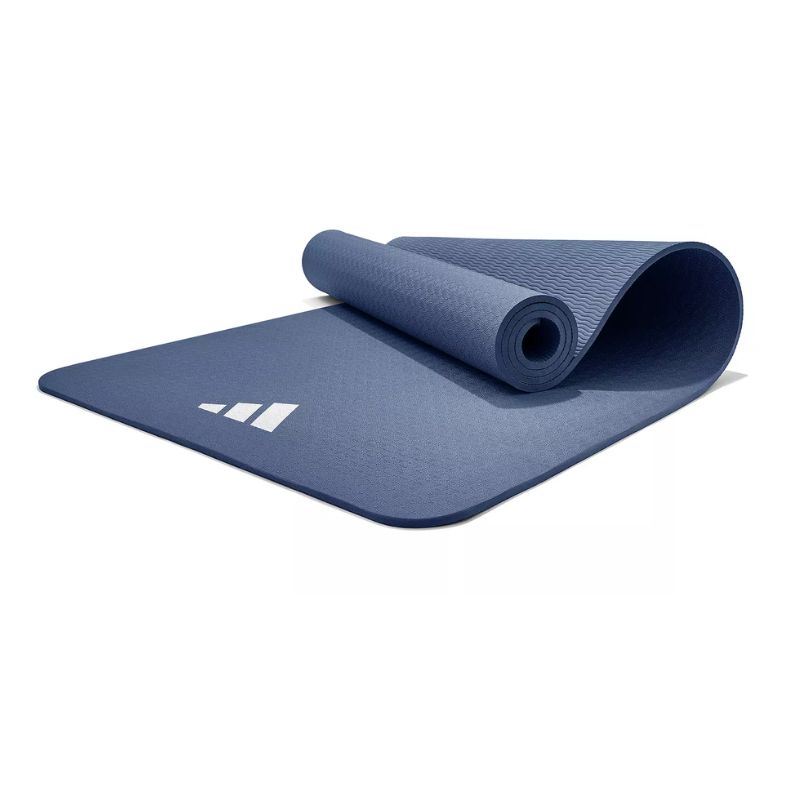
Thickness: 8mm | Weight: 500g
For me, 8mm is ideal for workouts where you need to move but want more support than 4mm when your feet come to land. At double the thickness, the Adidas Foam Mat is my pick of the bunch for any kettlebell or dumbbell workouts at home.
With the ridged underside, it stays firm on wooden floor and carpet, not shifting even through the higher-intensity workouts I put it through using some of the best workout apps. The foam is medium density, meaning it has a little give underfoot, which I found offered more support during jumping workouts or workouts involving jumping.
As it's made from relatively sweat-resistant EVA/TPE foam materials, it's also very easy to keep clean with just a wipe after use, and the mat isn't so thick that it unfurls when it rolls away, which is great for storing it away after use.
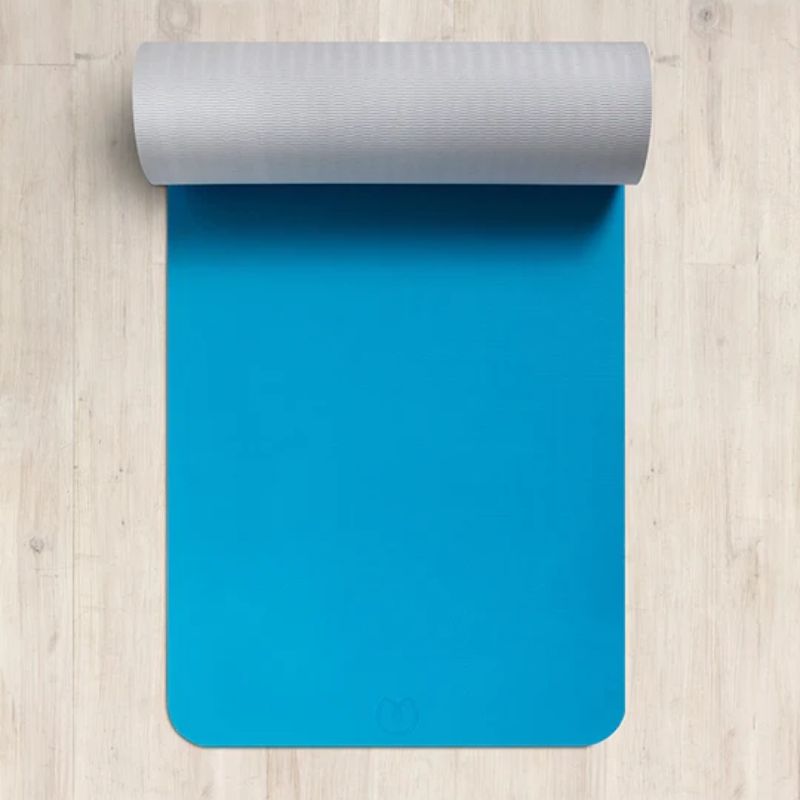
Thickness: 8mm | Weight: 1.5kg
The Yogamatters Everyday Wellness Mat is a long-standing favourite of mine. It blends comfort and support with durability, creating a sturdy surface to exercise on. Having been out of stock for a few months, I'm so pleased to see it's back, as this mat narrowly missed out on the top spot in this list.
I have sensitive knees from a running injury years ago, and I find this mat makes my yoga poses (like child's pose and Shavasana) so much more comfortable. I almost couldn't feel the ground under me. The mat is reversible, but both sides feel grippier than most standard yoga mats to me, making it a great option for sweatier workouts and stability exercises. I also appreciate this when I'm working out in my living room at home, as the mat doesn't slide over the wooden floor.
Compared to other options at a similar thickness, the Yogamatters Everyday Wellness Mat is also relatively lightweight at 1.5kg, and having used it for over a year, I can confidently say it's worth the price. I've used this mat frequently for my beginner's kettlebell workout and Pilates with weights, along with regular stretching, and it's been just perfect.
Pros
- Feels durable
- Relatively lightweight
- Suitable for all workouts
- Stable
Cons
- Harder to clean than others
Testing the best thick yoga mats
10/12/2025: While the majority of these mats were tested throughout 2024, I've conducted a second and third review in 2025 and believe these are still the best thick yoga mats. I added the Adidas Foam Mat in the latest update.
How we tested the best thick yoga mats
The woman&home health team and our expert testers put all the thick yoga mats in this guide to the test through multiple yoga sessions, ranging from intense cardio-based Vinyasa yoga classes to beginners' stretching sessions. We also tested the mats in strength workouts and Pilates classes.
When reviewing the mats, we considered the following criteria:
- Thickness: Every yoga mat we tried had to be above 4mm thick as the minimum required to be a thick yoga mat. Anything above 6mm was great and all yoga mats above 8mm were prioritised as specialist mats.
- Grip: Was the mat non-slip? We noted whether each mat offered plenty of grip and support. After all, you don't want to be sliding around while trying to get into downward dog.
- Design: Not only did we look at the designs and colourways on offer, but we also evaluated the materials. We tested mats made from everything from natural rubber and man-made rubber to PVC.
- Weight: A weighty mat will feel luxe and durable, and it could help with stability, but for those who want a yoga mat for on-the-go, a lightweight option is best. We considered a range of weights to highlight the best ones in each category.
- Price: When testing, we also considered the price. Quality yoga mats don't have to be expensive, and sometimes it's best to opt for a budget option if you're new to the practice. Yoga should be an accessible activity for everyone, so as well as including luxury buys, we've included mats from across the market's price spectrum.
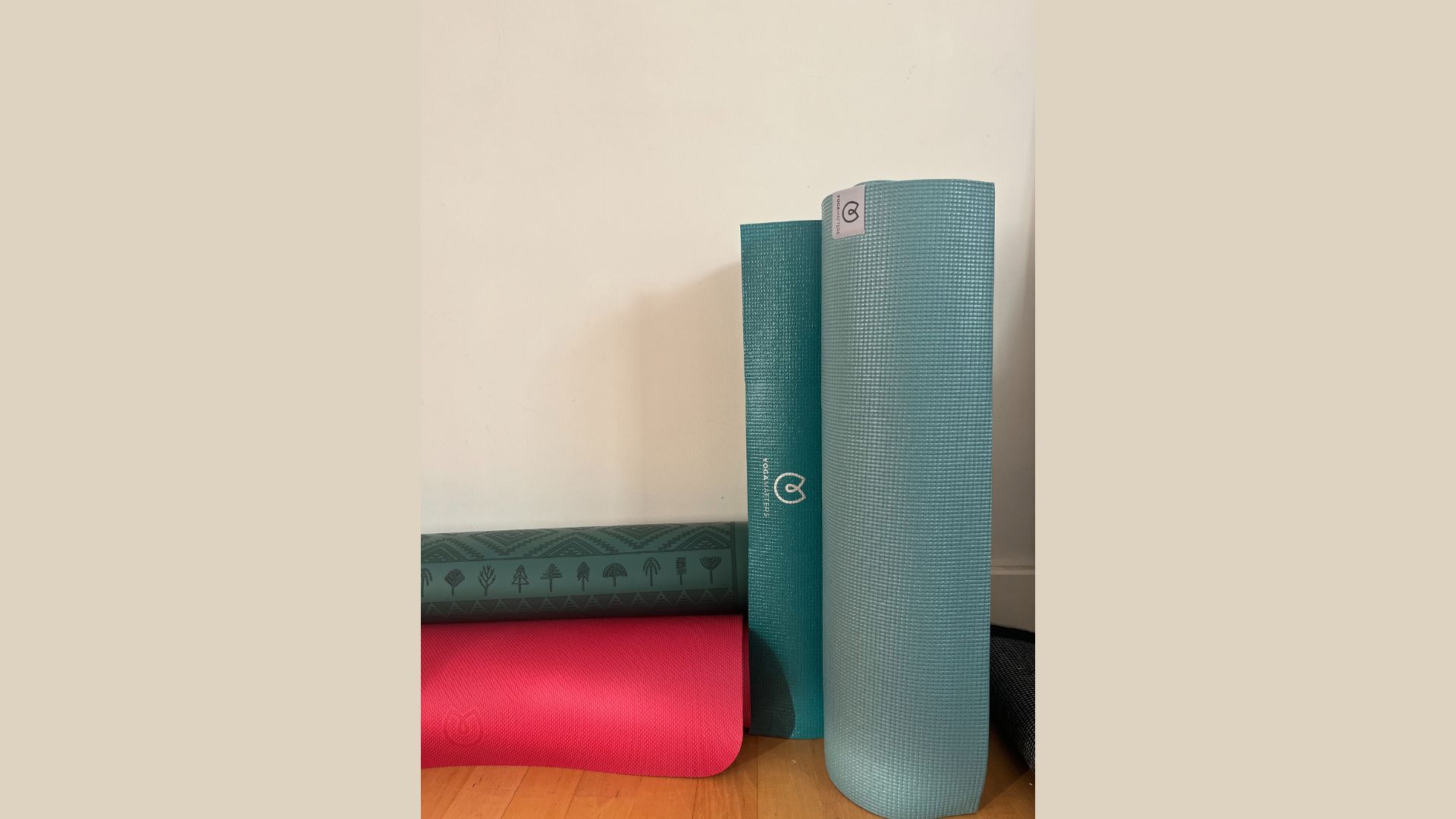
Ciara McGinley and Grace Walsh tried and tested many of the best thick yoga mats on this list.
How thick should a yoga mat be?
A yoga mat is about 3mm thick, while thicker options are usually 6mm or above. Anything thinner than 3mm and you risk not having adequate support for your back, feet, knees, and other parts of the body that come under pressure during the practice.
When figuring out how to choose a yoga mat you like, thickness should be a consideration. For maximum thickness, opt for a mat of at least 8mm, but a mat of at least 6mm should be enough to support the major joints in the body.
Ultimately, how thick your yoga mat should be is down to you and your practice. "There is no real ideal thickness for a yoga mat, it all depends on the person practising, style of yoga being practised and where the practice is taking place," Georgie Davies, a yoga teacher who teaches vinyasa yoga as well as gentler classes, tells us.
"For instance, you may not need as much padding in the mat if you're practising at home on carpet compared to the wooden floor of a studio," says Georgie, who also created an online yoga platform, Yogipod. "If the class you're taking explores a lot of postures on the hands and knees or if you have any conditions that make that uncomfortable, then more padding would be ideal."
It's also worth noting that the extra padding of thicker mats may feel nice for certain poses, but you're less connected to the floor. This could impact your ability to balance or land correctly during higher-energy movements.
"Thicker mats can make it harder to find balance in one-legged postures such as Vrksasana (tree pose) or stability in standing postures due to the depth of padding underneath the foot," explains Georgie. "This can be mitigated, though, by moving balancing postures off the mat so that the padding is there when required and also creating more stability and strength in the ankles, feet and legs."
Georgie Davies is a certified yoga teacher and founder of Yogipod, a business of handprinted yoga props and homewares.
Sign up to our free daily email for the latest royal and entertainment news, interesting opinion, expert advice on styling and beauty trends, and no-nonsense guides to the health and wellness questions you want answered.

Grace Walsh is woman&home's Health Channel Editor, working across the areas of fitness, nutrition, sleep, mental health, relationships, and sex. She is also a qualified fitness instructor.
A digital journalist with over seven years experience as a writer and editor for UK publications, Grace has covered (almost) everything in the world of health and wellbeing with bylines in Cosmopolitan, Red, The i Paper, GoodtoKnow, and more.